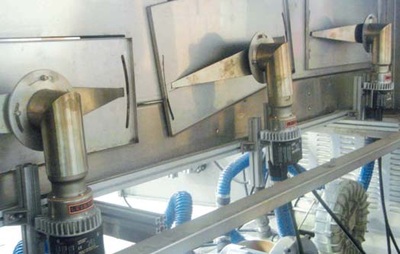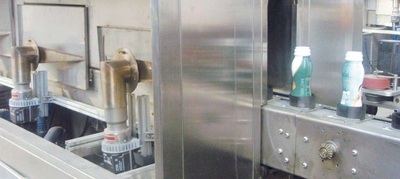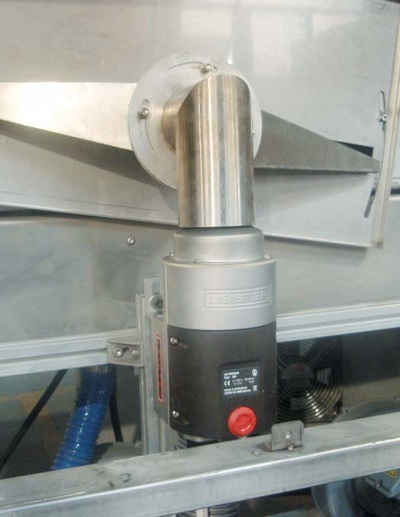|
During the last couple of years, the technology used to apply shrink-sleeves on bottles has changed. While steam tunnels were primarily used for shrinking in the past, today's producers of beverage and dairy products tend to use more cost-effective hot-air technology. Click image to enlarge. Two different techniques
Basically, there are two distinctly different techniques for developing the heat required to shrink sleeves: one is by using steam, the other by using hot-air. In the past, two primary reasons favoured the use of steam in the shrinking process. Since many industries were already using steam for other processes, they favoured the use of steam tunnels for shrinking. Furthermore, the hot-air technique not well known among producers of sleeve labelling machines. Trend reversal There seems to be a growing change in this trend. During times of economic crisis, many producers of beverages have been forced to optimize their processes. Depending on the application, shrinking with hot-air may be more efficient than using steam tunnels. Especially appealing is the fact that hot air can be precisely applied to the exact spot, where the heat is required. A significant number of producers decided to outsource the shrinking process to their bottle manufacturers. As these companies are not normally equipped with steam capability, they opted for the more cost-effective hot-air technique. Outsourcing as an opportunity The effects of the outsourcing of the shrinking process were felt by LEBAL: LEBAL is a prominent manufacturer of sleeve labelling machines, based in Shanghai, China. In reaction to this new demand, the engineers of LEBAL developed a sleeve labelling system using hot-air. This new labelling system is equipped with six LE 5000 S air heaters, achieving a throughput of 600 bottles per minute! Good advice means successful cooperation In September 2009, employees of both Leister Shanghai and the Leister distribution partner “Li Rong Company” visited the “Zhejiang Shen Xin Package Company”. This resulted in the sale of two new sleeve labelling systems, equipped with Leister air heaters. The air heaters are now installed and running smoothly. The shrinking results and the production rates are exceeding the customer's expectations. He is especially pleased that he can regulate the shrinking temperature to meet the varying requirements of different bottle sizes. An additional feature is that the inside of the bottle is perfectly dry by the end of the shrinking process. This means that the bottles can be delivered directly to the beverage producer, without the need to dry the bottles in an additional process. Leister is first choice Today, mechanical engineers often use Leister air heaters for their shrink labelling machines. The Leister brand stands for hot-air heating products of extraordinary quality and lifespan – even when used in continuous operation and extreme conditions. Hot air is hygienic Bottle manufacturers apply the sleeve directly onto the empty bottle. Using steam for shrinking will always leave the bottle with residue of steam or condensate. After the bottles have been filled, these residues may lead to mold growth around the lid during storage. By contrast, shrinking with hot-air will dry out the bottles completely, so that they can be passed on for bottling without an additional drying process. Expectations rise with the development of technology During 2008 and 2009, LEBAL Shanghai was able to sell several dozen sleeve labelling systems. Customers have been thrilled with these products. As the next step in shrinking process development, LEBAL is using the new Leister air heater LHS SYSTEM 60S for their latest prototype shrink-sleeve machine. The LHS SYSTEM 60S, 9 kW hot-air system features real-time status monitoring, which allows the hot-air system to be even more precisely controlled and regulated. Comments are closed.
|
|
STANMECH Technologies Inc.
944 Zelco Drive Burlington ON L7L 4Y3 | 1-888-438-6324 | [email protected] Terms of Use Privacy Terms and Conditions of Sale Warranty Policy |
|
Proud Member of:




